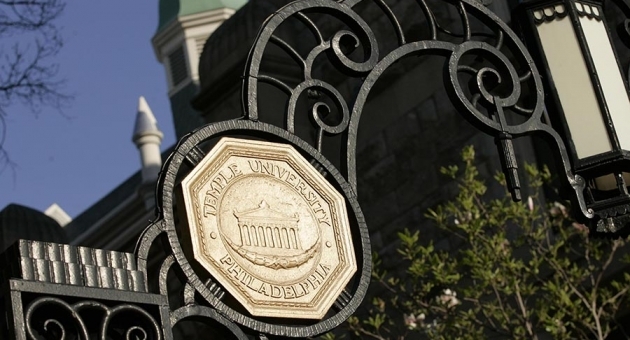Findings of Campus Sexual Misconduct Committee announced

Temple University President Neil D. Theobald today announced that the Presidential Committee on Campus Sexual Misconduct, which he appointed in fall 2014, has completed its tasks and that his office is already implementing many of the recommendations.
When Theobald convened the committee in September 2014, he outlined its threefold charge: to conduct a universitywide climate survey to better understand students’ perceptions of sexual misconduct and the resources that Temple offers; to review current policies and procedures; and to benchmark Temple against best practices identified in academic research and at other institutions.
“I extend my sincere appreciation to the committee members for their fine work and to the Temple students who participated in the committee’s climate survey,” Theobald said. “The multidisciplinary insight from the committee and the perspectives of our students were indispensable in helping us understand these complex issues and how we can best serve our students.”
In a memo to the campus community released today, the president said that one of the primary needs the committee identified is better education, awareness, and accessibility of sexual misconduct resources offered by Temple and other agencies, as well as of the university policies that govern issues related to sexual misconduct.
A key recommendation of the committee, Theobald said, is to create a single, easily understood website for this information. Therefore, Temple has developed a Sexual Misconduct Resources website to more clearly outline various methods of reporting, support services, resources and policies. More updates are planned for the site during the fall semester.
“Temple has tremendous resources available for education, information and response,” the president said. “We need a single-source site that ensures this information is easily available for anyone who may need it.”
In addition, Theobald said that Temple is updating its Student Conduct Code to enhance internal processes for handling sexual misconduct complaints. The university will be adding a specially trained retired judge to conduct certain hearings.
A third initiative Theobald highlighted is implementing mandatory, annual online sexual misconduct awareness training for sophomores, juniors and seniors. Similar programs are already offered to incoming students, and Temple provides small-group training sessions throughout the year. The university will expand these programs to faculty and staff as appropriate.
A major recommendation that Theobald has not approved is creating a centralized sexual misconduct office. “I believe we have the capacity and skills needed to oversee these efforts without creating another administrative office at Temple,” the president said. “I commit that if my judgment proves incorrect, I will revisit this recommendation. I also commit that lack of resources will not be the reason that the university is unable to carry out these critical duties.”
Theobald also noted that, as a part of his strategic priorities, funding will come from his office to strengthen the services offered by Temple as the university continues to review its short- and long-term needs.
“Sexual misconduct is a serious issue, and we must all work together to create and maintain a safe, respectful and welcoming environment on our campus,” Theobald said. “The committee’s review of efforts at other universities makes it clear there is no easy, straightforward solution. The plans we have developed further enhance the information, support services and fair proceedings that are available to all parties.”
Theobald thanked Committee Chair Laura Siminoff, dean of Temple’s College of Public Health, as well as the faculty, administrators and students on the committee:
Alice J. Hausman, professor, College of Public Health
Bernie Newman, interim chair and associate professor, School of Social Work
Richard Greenstein, professor, Beasley School of Law
Charles J. Leone, executive director, Campus Safety Services
Stephanie Ives, associate vice president for student affairs and dean of students
Sherryta Freeman, senior associate athletic director for compliance and student-athlete affairs
Sandra Foehl, director of equal opportunity compliance and Title IX coordinator
Lisa Zimmaro, assistant vice president, risk management and treasury
Blair Alston, Brittany Lewis and Nicholas Perugini, undergraduate students
In addition to these members, Kaitlin Bangert from the College of Public Health provided committee support, while Cameron Etezady, associate university counsel, advised the committee. Laurie Ann Maurer and Mary Kate Kalinich, along with Research Associate Kristin Kopec, provided administrative support and perspective from Temple’s graduate students.